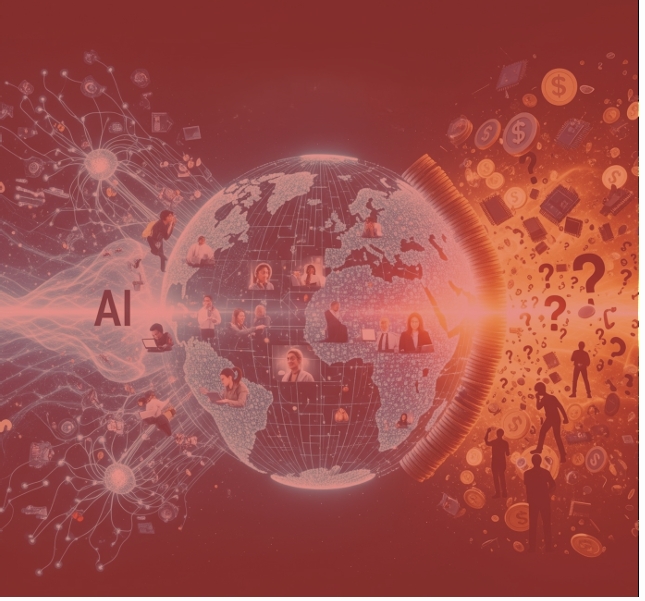
The Great Reset: How AI, Cost Pressures & Skills Gaps Are Reshaping the Global Tech Workforce
The global tech sector—once synonymous with relentless growth, generous perks, and digital utopia—is facing a sobering inflection point in 2025. A convergence of macroeconomic headwinds, rapid AI adoption, and a widening skills chasm has triggered a global layoff wave, displacing thousands and reshaping the structure of tech work as we’ve known it.
From Silicon Valley to Bengaluru, tech giants and mid-market players alike are streamlining their workforces—not merely for cost-cutting, but in pursuit of agility, automation, and AI-native operations.
The Numbers Tell a Stark Story
- Over 185,000 tech jobs have been cut globally in the first half of 2025, across more than 150 companies.
- The top five contributors:
- Amazon: ~18,000
- Microsoft: ~8,500
- Google/Alphabet: ~7,200
- Meta: ~6,000
- Intel: ~10,000–22,000
- AI and automation were cited as key restructuring reasons in 35–70% of cases (Konceptual AI Report, 2025).
This isn’t a seasonal dip. It’s a structural recalibration.
What’s Driving the Layoffs?
1. AI Integration at Scale
Generative AI and autonomous agents have reached enterprise maturity. Tools once used by early adopters—like ChatGPT, Microsoft Copilot, Salesforce Einstein, and Anthropic’s Claude—are now embedded across sales, HR, content creation, customer service, and even software development.
- Salesforce recently rolled out Agentforce, a suite of autonomous agents handling everything from fraud detection to customer onboarding.
- Meta began allowing job candidates to use AI tools during technical interviews, signaling that AI literacy is now a baseline, not a bonus.
“We’re not replacing humans. We’re removing inefficiencies. Unfortunately, that means fewer humans,” said a senior executive from a U.S.-based cloud company who asked not to be named.
Cost Optimization in a Volatile Market
Post-pandemic overhiring, declining ad revenues, and investor pressure for profitability have made cost discipline a non-negotiable. With AI offering productivity gains of up to 40%, leadership teams are choosing lean, AI-augmented teams over bloated structures.
- Goldman Sachs estimates AI can save firms $2.2 trillion globally by 2030 through job automation and augmentation.
- McKinsey notes that 25–30% of repetitive tasks in IT, finance, and marketing can now be fully automated.
The Skills Gap: A Crisis Within a Crisis
According to TechKV’s 2025 AI Workforce Report:
- 61% of tech layoffs were linked to skill mismatches.
- Workers without AI, data analytics, or automation fluency were 2.3× more likely to be laid off.
- Only 27% of companies had formal reskilling programs in place before initiating layoffs.
“The real layoff isn’t just about cost—it’s about relevance. If your skills don’t evolve, neither does your job,” notes HR strategist Radhika Menon.
🔬 Use Cases: Layoffs in Action
TCS (India): Realigning for Relevance
In July 2025, TCS cut 12,000 jobs, primarily at middle and senior levels. The reason? A steep drop in demand for legacy IT services and insufficient AI/cloud skills.
- TCS’s pivot to AI-focused digital transformation meant shedding roles tied to traditional testing and support services.
- Simultaneously, the company pledged to hire 20,000 freshers, trained in AI, analytics, and platform engineering.
“We aren’t downsizing. We’re future-sizing,” said K. Krithivasan, CEO, in an internal note. (in quotes)
Microsoft: Flattening with Foresight
In Q2 2025, Microsoft laid off ~6,000 people, with a focus on product managers, middle managers, and non-technical roles.
- Much of the reorganization centered around consolidating teams using AI Co-Pilot tools to manage documentation, task assignment, and product testing.
- The company reinvested savings into expanding its Azure AI and Gaming AI divisions.
- Satya Nadella (CEO, Microsoft)
“AI is the defining technology of our time. As we integrate it deeper into our work, the need to continuously learn and adapt becomes non-negotiable.” (in quotes)
Chegg: Disrupted by the Disruptor
The ed-tech company Chegg slashed 248 jobs (22%), citing declining user engagement and direct competition from AI-based tutors like ChatGPT and Claude.
- The company pivoted to building its own learning AI, but the damage to its textbook subscription model was already done.
Industry Shifts & Economic Consequences
- According to Goldman Sachs, unemployment among young tech workers (20–30) has increased by 3%—four times the national average.
- PwC’s 2025 AI Barometer reveals that workers with demonstrable AI skills now command wage premiums of 40–65%, particularly in hybrid roles combining domain expertise with automation fluency.
- LinkedIn’s Global Workforce Report shows that 47% of tech job listings in 2025 do not require a traditional 4-year degree—but do require certifications in AI, data, or cloud.
📈 Strategic Takeaways for Business Leaders
- From Headcount to Skillcount
Workforce planning is no longer about roles—it’s about capabilities. Firms are now mapping employees to skill clusters, not just job titles. - Reskilling is Risk Mitigation
Companies with active reskilling programs showed 27% lower attrition and 32% higher internal mobility, according to BCG’s latest HR study. - AI-Ready Culture
Tech fluency, prompt engineering, and AI oversight should be core skills across functions—not siloed in IT. - Mid-Career Risk is Real
Middle managers and traditionalists with stagnant skill sets are most at risk. Companies must provide adaptive learning paths or face increased churn.
Klaus Schwab (Founder, World Economic Forum)
“In the Fourth Industrial Revolution, talent, not capital, will be the key factor of production.” (in quotes)
Final Word: A Redefinition, Not Just a Reduction
What we’re witnessing in 2025 isn’t just downsizing—it’s a massive realignment of talent, tools, and technology.
The layoffs may be painful, but they’re also illuminating a clear path forward: a future workforce that’s AI-native, resilient, and endlessly adaptable.
“Survival won’t belong to the biggest or the best. It will belong to the most adaptable,” wrote Charles Darwin. And today, that rings true not just for species—but for companies and careers alike.
Citations :
https://hbr.org | https://sloanreview.mit.edu
https://economictimes.indiatimes.com
https://edition.cnn.com/business

List of Comments
Leave a Comment